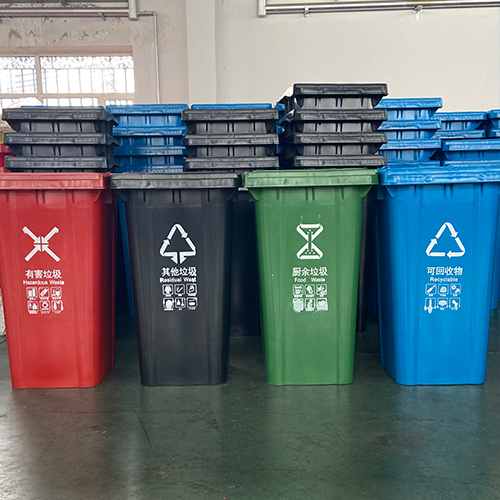Medical waste refers to the waste generated in medical activities, including medical waste, medical waste water, medical waste gas and radioactive source waste. Medical waste covers waste from hospitals, clinics, pharmacies, research laboratories and other medical institutions, including the collection, treatment and disposal of medical waste. The storage and management of medical waste is vital, because they may carry pathogenic bacteria and other harmful substances, causing serious harm to human beings and the environment.
240L plastic trash can It is a common waste collection container, usually used in families, businesses and public places. Because they are durable, easy to clean and customizable, they are widely used. However, is a plastic trash can suitable for medical waste storage?
First, we need to consider the special nature of medical waste. Medical waste may include infectious waste, sharp articles (such as syringes and needles), laboratory waste, drug residues, chemicals and radioactive waste. These wastes are potentially dangerous, such as spreading diseases, stabbing and polluting the environment.
Secondly, we need to consider whether the performance and materials of plastic trash can can meet the safety requirements of medical waste. Some plastic trash cans may not be resistant to high temperature, flammable, easily cracked or airtight, which may lead to the risk of waste leakage, infection transmission and environmental pollution. In addition, the materials of some plastic trash cans may be sensitive to chemical substances, which may cause the waste to react with the plastic trash cans and produce harmful substances.

In response to the above problems, special containers specially designed for medical waste storage have also been developed and used. These special containers are usually made of special materials, such as polypropylene (PP) and polyvinyl chloride (PVC). They have the characteristics of high temperature resistance, corrosion resistance, chemical resistance and good sealing. In addition, the medical waste container is also specially designed with safety measures such as easy opening and closing, waste leakage prevention and puncture prevention.
Therefore, to sum up, although 240L plastic garbage cans can be used as waste collection containers under normal circumstances, they may not be an option for the storage of medical waste. For the safety management of medical waste, we recommend the use of specially designed medical waste containers to ensure the safe treatment and disposal of waste. This can reduce the risk of waste leakage, infection transmission and environmental pollution, and protect human health and environmental safety.
However, in addition to the correct use of special containers, we should also pay attention to the classification, packaging and correct treatment of medical waste. Reasonable classification and packaging can reduce the volume and direct contact of waste and reduce the potential risk. The correct treatment and disposal can comply with relevant regulations and standards, including incineration, disinfection, sterilization and other methods, so as to ensure the safe treatment and harmless treatment of waste.
In a word, although 240L plastic trash can is a common waste collection container, we recommend to use specially designed medical waste containers for the storage of medical waste to ensure the safe treatment and disposal of waste. It is very important for the management of medical waste to comply with relevant regulations and standards, and take appropriate measures to reduce the harm of waste and environmental pollution. This can protect human health and environmental safety.




